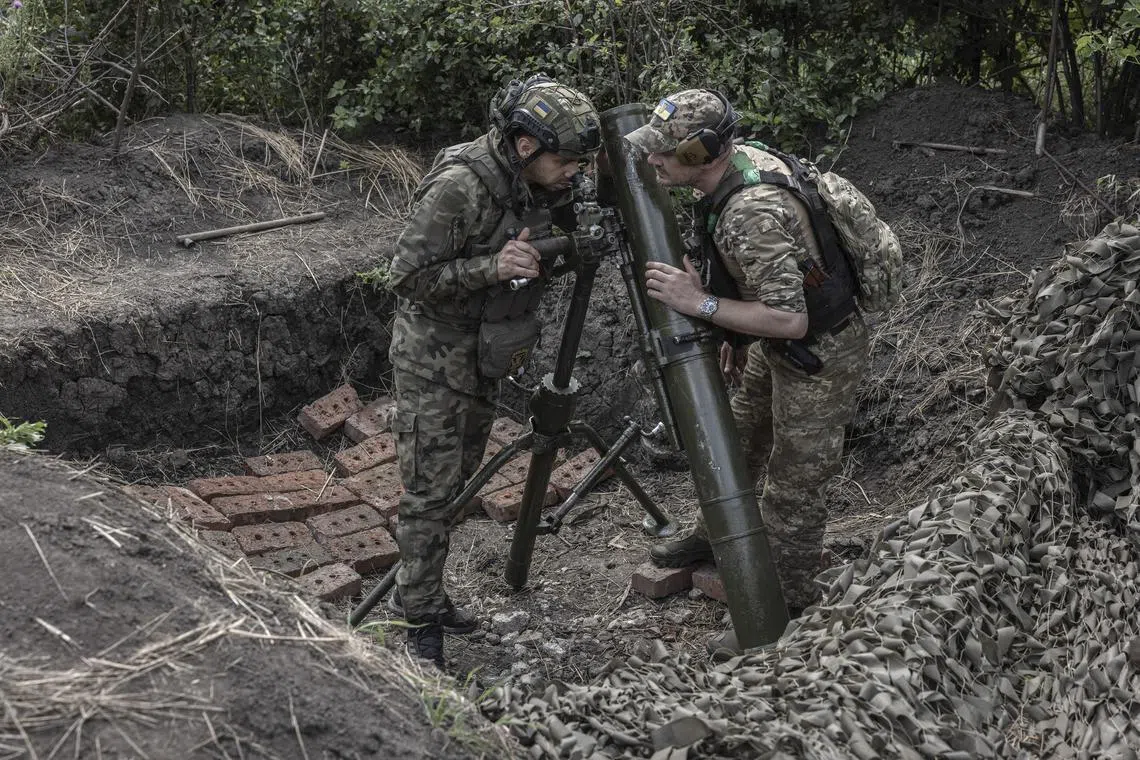Ukraine starts new diplomatic push to weaken Russia
Sign up now: Get ST's newsletters delivered to your inbox

The meeting is the starting point of what is expected to be a major Ukrainian diplomatic push to try to undercut Russia.
PHOTO: NYTIMES
KYIV - Ukraine will make a renewed push this weekend at a gathering in Saudi Arabia to win the support of dozens of countries that have remained on the sidelines of the war – the start of a broader campaign in the months ahead to build the diplomatic muscle to isolate and weaken Russia.
Ukraine and Saudi Arabia invited diplomats from some 40 governments to talks
Notable among them were China, India, Brazil, South Africa and some of the oil-rich Gulf nations that have tried to maintain good relations with both Ukraine and Russia throughout the war, which began in February 2022.
Many of the invited governments reject the very concept of choosing sides, framing the war as a contest between global powers that they want no part in, and even with the event fast approaching, it was unclear how many would attend.
The meeting is the starting point of what is expected to be a major Ukrainian diplomatic push in the coming months to try to undercut Russia.
It began Wednesday, when president Volodymyr Zelensky of Ukraine recalled his ambassadors for an emergency strategy session on how to get the country’s message out to the world.
He told the ambassadors they must use every tool at their disposal – “official and unofficial, institutional and media, cultural diplomacy and the power of ordinary human sincerity” – to convince both steadfast allies and nations that have largely stayed neutral that the only road to a lasting peace is complete Russian defeat.
The annual United Nations General Assembly session in September will offer another opportunity for Ukraine to make its case. The country is also planning a summit later in the fall to shore up backing for its 10-point peace formula in the hopes that it will form the backbone of any future settlement.
For Ukraine, the gathering comes at a pivotal moment.
As furious battles rage across the front lines of Europe’s bloodiest war in decades, Mr Zelensky told his diplomats on Wednesday that things would grow even more difficult as pressure was likely to build in the coming months to find a negotiated path to peace.
The choice of Saudi Arabia as host was no accident, senior Ukrainian officials said, noting the efforts that Kyiv has made to court the resource-rich kingdom.
Like many countries in the Middle East, Saudi Arabia has toed a careful line in the war, giving financial aid to Ukraine even while cultivating close ties to Russia.
China, which shunned a similar gathering in June in Copenhagen, Denmark, said it would attend the Saudi meeting,
China has tried to walk a tightrope on the war by claiming neutrality despite providing Russia with vital support that has helped cushion the effects of economic sanctions and diplomatic isolation.
Ms Alicja Bachulska, a fellow at the European Council on Foreign Relations who studies Chinese foreign policy, said that China’s participation does not mean it is changing its position on the war.
But it could help burnish a carefully cultivated effort to look like a responsible and neutral actor, she said.
“Simply put, it seems like a win-win scenario for Beijing,” said Ms Bachulska.
For Saudi Arabia, which has long served as a mediator in regional conflicts, the gathering in Jeddah is notable because the kingdom is involving itself prominently in a crisis of the highest global priority.
This past winter, Prince Faisal bin Farhan became the first Saudi foreign minister to visit Ukraine since the two countries established diplomatic relations three decades ago.
The de facto Saudi ruler, Crown Prince Mohammed bin Salman, invited Mr Zelensky to speak in May in Jeddah at a gathering of Arab states, where the Ukrainian leader urged Middle Eastern rulers to get off the fence and stand with his country against Russia.
For Crown Prince Mohammed, 38, the talks this weekend offer another chance to try to position himself as a world leader with influence well beyond his region and as a mediator who can bring the neutral states to the table.
When Saudi agents killed Mr Jamal Khashoggi, a Washington Post columnist critical of the monarchy, in 2018, it briefly rendered the crown prince an international pariah. But he has since sought to demonstrate that he is too powerful to ignore, and has rebuilt his relationship with the US and other allies.
“Hosting the Ukraine peace talks gives us a taste of Saudi Arabia’s reinvigorated self,” said Mr Bader Al-Saif, an assistant professor of history at Kuwait University.
Ukraine faces a dual diplomatic challenge as it embarks on its diplomatic push.
It needs to keep the support of Western allies firm as it engages in a gruelling, bloody and costly counter-offensive that, over the past two months, has yielded some gains but has yet to achieve a major breakthrough.
But it also needs to broaden that support by pulling in other countries that have remained non-committal. NYTIMES


